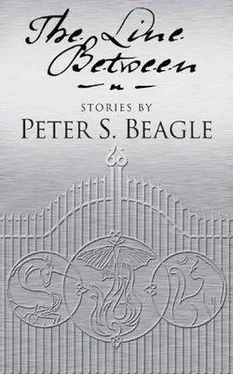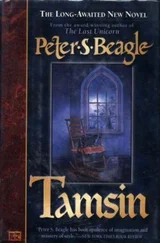Peter Beagle - The Line Between
Здесь есть возможность читать онлайн «Peter Beagle - The Line Between» весь текст электронной книги совершенно бесплатно (целиком полную версию без сокращений). В некоторых случаях можно слушать аудио, скачать через торрент в формате fb2 и присутствует краткое содержание. Жанр: Фэнтези, на английском языке. Описание произведения, (предисловие) а так же отзывы посетителей доступны на портале библиотеки ЛибКат.
- Название:The Line Between
- Автор:
- Жанр:
- Год:неизвестен
- ISBN:нет данных
- Рейтинг книги:5 / 5. Голосов: 1
-
Избранное:Добавить в избранное
- Отзывы:
-
Ваша оценка:
- 100
- 1
- 2
- 3
- 4
- 5
The Line Between: краткое содержание, описание и аннотация
Предлагаем к чтению аннотацию, описание, краткое содержание или предисловие (зависит от того, что написал сам автор книги «The Line Between»). Если вы не нашли необходимую информацию о книге — напишите в комментариях, мы постараемся отыскать её.
The Line Between — читать онлайн бесплатно полную книгу (весь текст) целиком
Ниже представлен текст книги, разбитый по страницам. Система сохранения места последней прочитанной страницы, позволяет с удобством читать онлайн бесплатно книгу «The Line Between», без необходимости каждый раз заново искать на чём Вы остановились. Поставьте закладку, и сможете в любой момент перейти на страницу, на которой закончили чтение.
Интервал:
Закладка:
I had mentioned a rehearsal that night, but neither asked nor expected him to attend, only a few hours off the train. I cannot even remember telling him how to find the local beerhall where we have always rehearsed; yet there he was, indifferently polite as ever, tuning up with the rest of the strings. I gave a short, awkward speech, introducing our new first violin to the orchestra (at my prompting, he offered the transparently false Christian name of Oscar), and adding that, from what I had heard at my kitchen table, we could only gain from his accession to my former chair. Most of them were plainly disgruntled by the announcement — a flute and a trombone even wept briefly — which I found flattering, I must confess. But I reassured them that I had every intention of continuing as their devoted guide and leader, and they did
seem to take at least some solace from that pledge. No orchestra is ever one big, happy family, but we were all old comrades, which is decidedly better for the music. They would quickly adapt to the changed situation.
In fact, they adapted perhaps a trifle too quickly for my entire comfort. Within an hour they were exclaiming over Sigerson's tone and his rhythmic sense, praising his dynamics as they never had mine — no, this is not jealousy, simply a fact — and already beginning to chatter about the possibility of expanding our increasingly stale repertoire, of a single fresh and innovative voice changing the entire character of the orchestra. Sigerson was modest under their admiration, even diffident, waving all applause away; for myself, I spoke not at all, except to bring the rehearsal back into order when necessary. We dispersed full of visions — anyway, they did. I recall that a couple of the woodwinds were proposing the Mozart Violin Concerto, which was at least conceivable; and that same trombone even left whispering, " Symphonic Fantastique," which was simply silly. He had them thinking like that, you see, in one rehearsal, without trying.
And we did make changes. Of course we did. You exploit the talent you have available, and Sigerson's presence made it possible for me to consider attempting works a good bit more demanding than the Greater Bornitz Municipal Orchestra had performed in its entire career. No, I should have said, «existence.» Other orchestras have careers. We are merely happy still to be here.
Berlioz, no. They cannot play what he wrote in Paris, London, Vienna — how then in St. Radomir? Beethoven, no, not even with an entire string section of Sigersons. But Handel … Haydn … Mozart … Telemann … yes, yes, the more I thought of it, there was never any real reason why we could not cope decently with such works; it was never anything but my foolish anxiety — and, to be fair to myself, our national inferiority complex, if we are even a nation at all. Who are we, in darkest Selmira, operetta Selmira, joke Selmira, comically backward Selmira, Selmira the laughingstock of bleakly backward Eastern Europe — or so we would be, if anyone knew exactly where we were — to imagine ourselves remotely capable of producing real music? Well, by God, we were going to imagine it, and if we made fools of ourselves in the attempt, what was new in that? At least we would be a different sort of fools than we had been. St. Radomir, Bornitz, Selmira … they would never have seen such fools.
That was the effect he had on us, your Mr. Sigerson, and whatever I think of him, for that I will always be grateful. True to his word, he made absolutely no effort to supplant my musical judgment with his own, or to subvert my leadership in any way. There were certainly those who sought him out for advice on everything from interpretation to fingering to modern bowing technique, but for all but the most technical matters he always referred them back to me. I think that this may have been less an issue of loyalty than of complete lack of interest in any sort of authority or influence — as I knew the man, that simply was not in him. He seemed primarily to wish to play music, and to be let alone. And which desire had priority, I could not
have told you, then or now.
Very well. You were asking me about the incident which, in my undoubtedly perverse humor, I choose to remember as The Matter of the Uxorious Cellist. Sigerson and I were allies — ill–matched ones, undoubtedly, but allies nonetheless — in this unlikely affair, and if we had not been, who's to say how it might have come out? On the other hand, if we had left it entirely alone … well, judge for yourself. Judge for yourself.
The Greater Bornitz Municipal Orchestra has always been weak in the lower strings, for some reason — it is very nearly a tradition with us. That year we boasted, remarkably, four cellists, two of them rather wispy young women who peeped around their instruments with an anxious and diffident air. The third, however, was a burly Russo–Bulgarian named Volodya Andrichev: blue–eyed, blue–chinned, wild–haired, the approximate size of a church door (and I mean an Orthodox church here), possessed of — or by — an attack that should by rights have set fire to his score. He ate music, if you understand me; he approached all composition as consumption, from Liszt and Rossini, at which he was splendid, to Schumann, whom he invariably left in shreds, no matter how I attempted to minimize his presence, or to conceal it outright. Nevertheless, I honored his passion and vivacity; and besides, I liked the man. He had the snuffling, shambling charm of the black bears that still wander our oak forests as though not entirely sure what they are doing here, but content enough nonetheless. I quite miss him, as much time as it's been.
His wife, Lyudmilla Plaschka, had been one of our better woodwinds, but retired on the day of their wedding, that being considered the only proper behavior for a married woman in those times. She was of Bohemian extraction, I believe: a round, blonde little person, distinctly appealing to a particular taste. I remember her singing (alto) with her church choir, eyes closed, hands clasped at her breast — a godly picture of innocent rapture. Yet every now and then, in the middle of a Bach cantata or some Requiem Mass, I would see those wide blue eyes come open, very briefly, regarding the tenor section with the slightest pagan glint in their corners. Basses, too, but especially the tenors. Odd, the detail with which these things come back to you.
He adored her, that big, clumsy, surly Andrichev, even more than he loved his superb Fabregas cello, and much in the same manner, since he plainly felt that both of them were vastly too good for him. Absolute adoration — I haven't encountered much of that in my life, not the real thing, the heart never meant for show that can't help showing itself. It was a touching thing to see, but annoying as well on occasion: during rehearsal, or even performance, I could always tell when his mind was wandering off home to his fluffy golden goddess. Played the devil with his vibrato every time, I can tell you.
To do her justice — very reluctantly — she had the decency, or the plain good sense, to avoid involvements with any of her husband's colleagues. As I have implied, she preferred fellow singers to instrumentalists anyway; and as Andrichev could not abide any sort of vocal recital («Better cats on a back fence," he used to roar, «better
a field full of donkeys in heat»), her inclinations and his rarely came into direct conflict. Thus, if we should chance to be performing in, say, Krasnogor, whose distance necessitates an overnight stay, while she was making merry music at home with Vlad, the clownish basso, or it might be Ruska, that nasal, off–key lyric tenor (there was a vibrato you could have driven a droshky through) … well, whatever the rest of us knew or thought, we kept our mouths shut. We played our Smetana and our Gilbert & Sullivan medley, and we kept our mouths shut.
Читать дальшеИнтервал:
Закладка:
Похожие книги на «The Line Between»
Представляем Вашему вниманию похожие книги на «The Line Between» списком для выбора. Мы отобрали схожую по названию и смыслу литературу в надежде предоставить читателям больше вариантов отыскать новые, интересные, ещё непрочитанные произведения.
Обсуждение, отзывы о книге «The Line Between» и просто собственные мнения читателей. Оставьте ваши комментарии, напишите, что Вы думаете о произведении, его смысле или главных героях. Укажите что конкретно понравилось, а что нет, и почему Вы так считаете.












